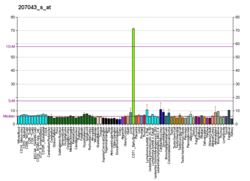Sodium- and chloride-dependent glycine transporter 1
Appearance
(Redirected from Glycine transporter 1)
Sodium- and chloride-dependent glycine transporter 1, also known as glycine transporter 1, is a protein that in humans is encoded by the SLC6A9 gene which is promising therapeutic target for treatment of diabetes and obesity. [5][6][7][8]
Selective inhibitors
[edit]Elevation of extracellular synaptic glycine concentration by blockade of GlyT1 has been hypothesized to potentiate NMDA receptor function in vivo and to represent a rational approach for the treatment of schizophrenia and cognitive disorders. Several drug candidates have reached clinical trials.[9]
- ASP2535[10]
- Bitopertin (RG1678), which has entered phase II trials for the treatment of schizophrenia[11]
- Iclepertin (BI 425809) by Boehringer Ingelheim which is thought to improve cognitive impairment due to schizophrenia
- Org 25935 (Sch 900435)
- PF-03463275 (in phase II trial)
- Pesampator (PF-04958242) by Pfizer
- Sarcosine which is thought to improve cognitive impairment due to schizophrenia
Pathological mutations
[edit]Mutations of the gene may cause a severe metabolic disorder discovered in 2016 and called glycine encephalopathy with normal serum glycine (OMIM 617301), also known as GlyT1 encephalopathy.
See also
[edit]References
[edit]- ^ a b c GRCh38: Ensembl release 89: ENSG00000196517 – Ensembl, May 2017
- ^ a b c GRCm38: Ensembl release 89: ENSMUSG00000028542 – Ensembl, May 2017
- ^ "Human PubMed Reference:". National Center for Biotechnology Information, U.S. National Library of Medicine.
- ^ "Mouse PubMed Reference:". National Center for Biotechnology Information, U.S. National Library of Medicine.
- ^ Sinha, Jitendra Kumar; Durgvanshi, Shantanu; Verma, Manish; Ghosh, Shampa (June 2023). "Investigation of SLC6A9 and SLC5A1 as a promising therapeutic target for obesity and diabetes using in silico characterization, 3D structure prediction and molecular docking analysis". Alzheimer's & Dementia. 19 (S1). doi:10.1002/alz.064229. ISSN 1552-5260.
- ^ Kim KM, Kingsmore SF, Han H, Yang-Feng TL, Godinot N, Seldin MF, Caron MG, Giros B (Jun 1994). "Cloning of the human glycine transporter type 1: molecular and pharmacological characterization of novel isoform variants and chromosomal localization of the gene in the human and mouse genomes". Mol Pharmacol. 45 (4): 608–17. PMID 8183239.
- ^ Jones EM, Fernald A, Bell GI, Le Beau MM (Nov 1995). "Assignment of SLC6A9 to human chromosome band 1p33 by in situ hybridization". Cytogenet Cell Genet. 71 (3): 211. doi:10.1159/000134110. PMID 7587377.
- ^ "Entrez Gene: SLC6A9 solute carrier family 6 (neurotransmitter transporter, glycine), member 9".
- ^ Harvey, Robert J.; Yee, Benjamin K. (31 October 2013). "Glycine transporters as novel therapeutic targets in schizophrenia, alcohol dependence and pain". Nature Reviews Drug Discovery. 12 (11): 866–85. doi:10.1038/nrd3893. PMID 24172334. S2CID 28022131.
- ^ Harada K, Nakato K, Yarimizu J, Yamazaki M, Morita M, Takahashi S, Aota M, Saita K, Doihara H, Sato Y, Yamaji T, Ni K, Matsuoka N (2012). "A novel glycine transporter-1 (GlyT1) inhibitor, ASP2535 (4-[3-isopropyl-5-(6-phenyl-3-pyridyl)-4H-1,2,4-triazol-4-yl]-2,1,3-benzoxadiazole), improves cognition in animal models of cognitive impairment in schizophrenia and Alzheimer's disease". European Journal of Pharmacology. 685 (1–3): 59–69. doi:10.1016/j.ejphar.2012.04.013. PMID 22542656.
- ^ Pinard E, Alanine A, Alberati D, Bender M, Borroni E, Bourdeaux P, Brom V, Burner S, Fischer H, Hainzl D, Halm R, Hauser N, Jolidon S, Lengyel J, Marty HP, Meyer T, Moreau JL, Mory R, Narquizian R, Nettekoven M, Norcross RD, Puellmann B, Schmid P, Schmitt S, Stalder H, Wermuth R, Wettstein JG, Zimmerli D (June 2010). "Selective GlyT1 inhibitors: discovery of [4-(3-fluoro-5-trifluoromethylpyridin-2-yl)piperazin-1-yl][5-methanesulfonyl-2-((S)-2,2,2-trifluoro-1-methylethoxy)phenyl]methanone (RG1678), a promising novel medicine to treat schizophrenia". J. Med. Chem. 53 (12): 4603–14. doi:10.1021/jm100210p. PMID 20491477.
Further reading
[edit]- Olivares L, Aragón C, Giménez C, Zafra F (1995). "The role of N-glycosylation in the targeting and activity of the GLYT1 glycine transporter". J. Biol. Chem. 270 (16): 9437–42. doi:10.1074/jbc.270.16.9437. PMID 7721869.
- Borowsky B, Mezey E, Hoffman BJ (1993). "Two glycine transporter variants with distinct localization in the CNS and peripheral tissues are encoded by a common gene". Neuron. 10 (5): 851–63. doi:10.1016/0896-6273(93)90201-2. PMID 8494645. S2CID 24224402.
- Evans J, Herdon H, Cairns W, et al. (2000). "Cloning, functional characterisation and population analysis of a variant form of the human glycine type 2 transporter". FEBS Lett. 463 (3): 301–6. doi:10.1016/S0014-5793(99)01636-1. PMID 10606742. S2CID 21445629.
- Hanley JG, Jones EM, Moss SJ (2000). "GABA receptor rho1 subunit interacts with a novel splice variant of the glycine transporter, GLYT-1". J. Biol. Chem. 275 (2): 840–6. doi:10.1074/jbc.275.2.840. PMID 10625616.
- Geerlings A, López-Corcuera B, Aragón C (2000). "Characterization of the interactions between the glycine transporters GLYT1 and GLYT2 and the SNARE protein syntaxin 1A". FEBS Lett. 470 (1): 51–4. doi:10.1016/S0014-5793(00)01297-7. PMID 10722844. S2CID 46670631.
- Christie GR, Ford D, Howard A, et al. (2001). "Glycine supply to human enterocytes mediated by high-affinity basolateral GLYT1". Gastroenterology. 120 (2): 439–48. doi:10.1053/gast.2001.21207. PMID 11159884.
- Reye P, Penfold P, Pow DV (2001). "Glyt-1 expression in cultured human Müller cells and intact retinae". Glia. 34 (4): 311–5. doi:10.1002/glia.1064. PMID 11360303. S2CID 39431701.
- Geerlings A, Núñez E, Rodenstein L, et al. (2002). "Glycine transporter isoforms show differential subcellular localization in PC12 cells". J. Neurochem. 82 (1): 58–65. doi:10.1046/j.1471-4159.2002.00930.x. PMID 12091465.
- Brandenberger R, Wei H, Zhang S, et al. (2005). "Transcriptome characterization elucidates signaling networks that control human ES cell growth and differentiation". Nat. Biotechnol. 22 (6): 707–16. doi:10.1038/nbt971. PMID 15146197. S2CID 27764390.
- Antonov SM, Brovtsyna NB, Mironova EV (2005). "The mechanism of allosteric interaction of cytoplasmic and extracellular Cl− in the glial glycine transporter (hGlyTlb)". Dokl. Biol. Sci. 402 (1–6): 163–6. doi:10.1007/s10630-005-0076-z. PMID 16121932. S2CID 19628294.





